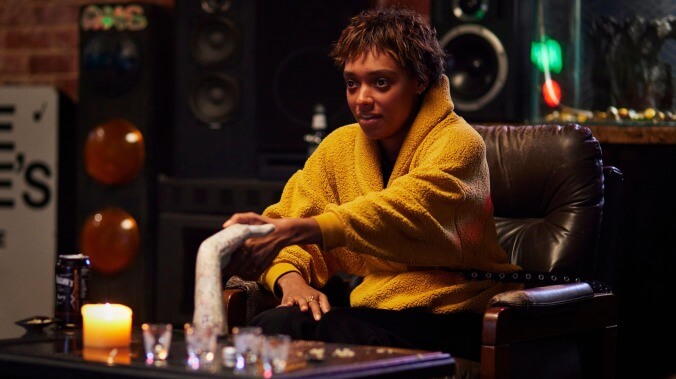Talk To Me review: A gripping tale of adolescent dread
A24's latest horror flick is simple yet effective, with a sense of dread that never truly dissipates

Between Ari Aster’s dueling horror hits Hereditary and Midsommar, Ti West’s X and its prequel Pearl, and a whole slew of now-iconic titles like Men, Bodies Bodies Bodies, and The Witch there’s no doubt about it: A24 is the incubator of up-and-coming horror. The latest title in the distributor’s impressive genre lineup is Danny and Michael Philippou’s joint directorial debut Talk To Me, which made the rounds with a buzzy Sundance festival release earlier this year. Though it leans on familiar genre tropes and stylistic conventions, a devastating script and charismatic cast (spearheaded by Sophie Wilde) make Talk To Me a terrifying and pervasively heartbreaking tale of grief.
Starring Wilde, Alexandra Jensen, Joe Bird, and Miranda Otto, Talk To Me follows Mia (Wilde), an Australian teen struggling to cope with her mother’s accidental overdose. In the time since her mother’s death, Mia has moved in with her best friend Jade (Jensen) and formed a close bond with Jade’s little brother Riley (Bird) and their neurotic but well-meaning mother (Otto).
When Mia is unexpectedly roped into a morose party game that’s been making the rounds online, she’s shocked to discover the seemingly “fake” trick (a ceramic hand that allows the user to speak to the dead) has very real, very unsettling properties. Soon, Mia is obsessed with trying to use the hand to communicate with her late mother, but her desperation to find closure soon begins to reap disastrous effects on Jade and her family.
There’s a thoroughly modern, youthful tone to Talk To Me’s script and performances that gives it an endearing quality straight off the bat. Of course, plenty of horror films over the past 15 years have played with the prevalence of cell phones in pop culture and how viral internet videos (even the disturbing ones) seem to enrapture young audiences, but with Talk To Me, the presence of cell phones goes beyond that.
Mia and her friends are constantly clutching their phones, but the film isn’t interested in criticizing them for it—instead, it uses their phones as a way to emphasize their constant connectivity, even with those who’ve passed on. Mia rewatches old Snapchat memories of herself and her mom, and plucks Riley’s still-playing phone from his hand after he falls asleep. It’s a small detail, but a familiar habit that helps make the characters of Talk To Me feel grounded and down to earth, which in turn makes the film’s emotional punches hurt even more.
And punch it does—after Mia and her friends have their fun and games taking videos of the hand forcing them to spew nonsense or (in one memorable case) kiss the family dog, things quickly spiral out of control and a blameless, terrified Riley lands in the hospital. From the second things begin to go south, Talk To Me doesn’t let up, and it soon becomes clear that Mia is a dangerously unreliable narrator whose need for closure ends up bringing ruin to the living still in her life.
Despite a runtime of only an hour and a half, Talk To Me (outside of its cold open, a genre staple) dedicates a majority of the first act to building believable bonds between Mia and Jade’s family—certainly a risky move for a horror flick, but one that pays off in spades. The familiar body language, banter, and sibling egging between Mia, Jade, and Riley elevates them beyond expendable horror characters and turns them into echoes of family or friends we might know in real life.
In turn, when things begin to turn sour, you’re terrified for Jade and Riley, but simultaneously unable to be truly upset with Mia for her continued desperation to use the hand—we’ve spent so much time with her already, and we know how devastated she is by the loss of her mother. What ensues is an excruciating tug-of-war between being terrified for Riley and heartbroken for Mia, and the film is unrelenting in its continued pitting of these two emotional facets against each other.
Certainly, Danny Philippou and Bill Hinzman’s understated yet deft script (based on a concept by Daley Pearson) is a crucial element in painting such a visceral portrait of Mia’s sorrow, but the true emotional meat of Talk To Me comes from Wilde’s all-encompassing performance. With her massive eyes and rail-thin frame, she sometimes looks more like a wild, terrified animal than a young woman—constantly hunching in on herself, riddled with tension, and twitching like an addict the more she begins to rely on the hand as a way to commune with her mother.
This hollow husk of a person sits in stark contrast to the grief-ridden but still wholly human and energetic Mia we meet at the beginning of the film. The fact that the audience is able to mark such a distinct difference between Mia before and after using the hand is a testament to how fully in control of her physicality Wilde is, and how deftly she’s able to melt the spirited, strong-willed Mia into the obsessive, paranoia-ridden Mia.
Yes, some of its imagery and thematic elements are tropes we’ve seen explored before—foreshadowing with dead animals, ghostly reflections in window panes and mirrors, and a constant flickering between reality and hallucination. But these elements are employed so expertly and used in service of such an emotional story that it’s easy to forgive a few cliches here and there—especially when Wilde is onscreen.
Fully realized through clever editing and music choices (from Geoff Lamb and Cornel Wilczek), Talk To Me is an adolescent tale of desperation, desire, and destruction—a simple yet effective horror film that instills a sense of dread that never truly dissipates.